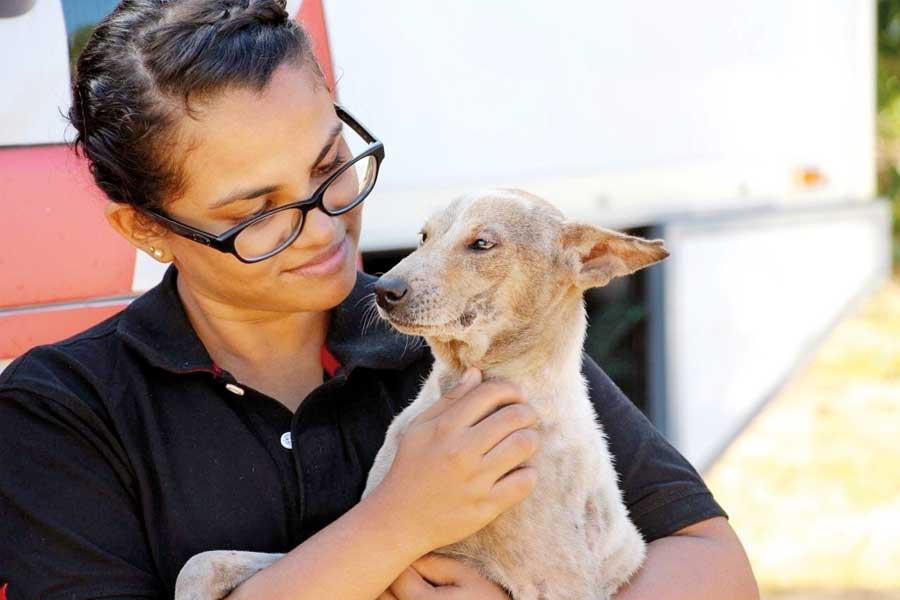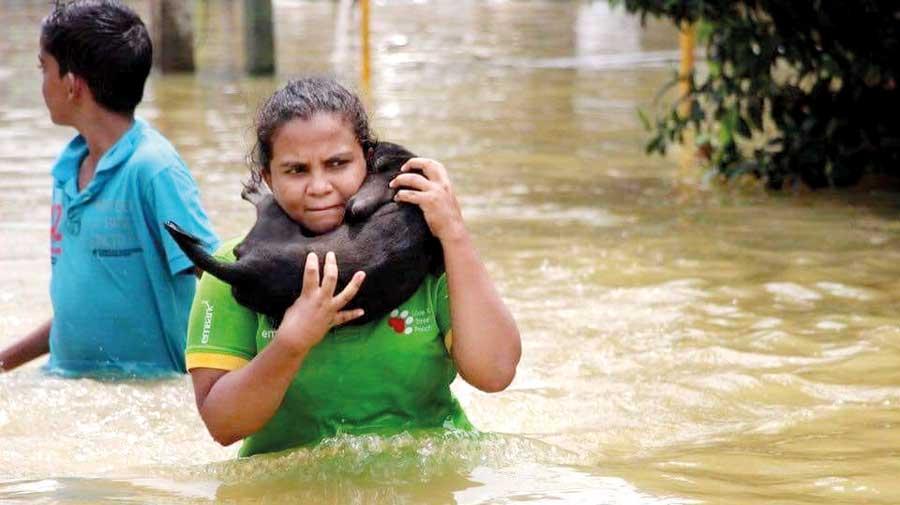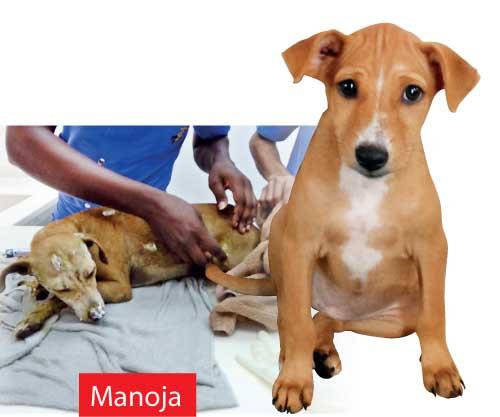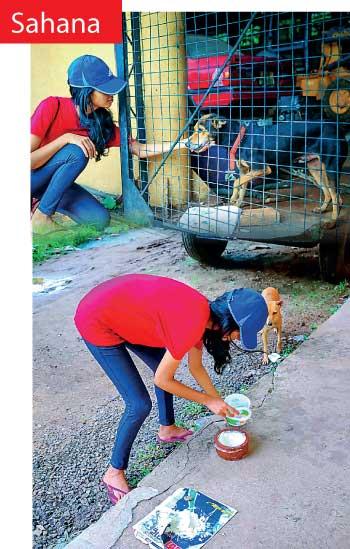Reply To:
Name - Reply Comment

Animal rescuers pushed to their limits
 Sri Lanka has a street animal crisis. You can’t blame the dogs and cats for it; they only live on the road because humans had a hand in putting them there, directly or indirectly. We’ve all seen boxes of puppies and kittens left at temple gates, but even adult animals that have been cared for in their entire lives aren’t immune from being dumped. The reasons are varied - the animal is injured, the family is moving house, a baby is coming. Pedigree dogs that have breed-specific medical conditions due to irresponsible backyard breeding are thrown out rather than pay for treatment. Even the mothers of these pedigree dogs can be left on the road after continual pregnancies because their bodies’ can’t produce enough puppies anymore.
Sri Lanka has a street animal crisis. You can’t blame the dogs and cats for it; they only live on the road because humans had a hand in putting them there, directly or indirectly. We’ve all seen boxes of puppies and kittens left at temple gates, but even adult animals that have been cared for in their entire lives aren’t immune from being dumped. The reasons are varied - the animal is injured, the family is moving house, a baby is coming. Pedigree dogs that have breed-specific medical conditions due to irresponsible backyard breeding are thrown out rather than pay for treatment. Even the mothers of these pedigree dogs can be left on the road after continual pregnancies because their bodies’ can’t produce enough puppies anymore.
Whatever the reason is, domestic animals in Sri Lanka have become disposable and the reality is that if you dump a dog or cat, you are condemning them to sickness, injury and potential death.
"Whatever the reason is, domestic animals in Sri Lanka have become disposable and the reality is that if you dump a dog or cat, you are condemning them to sickness, injury and potential death"
Picture this - female cats can breed three times a year and have an average of four kittens per litter. Dogs can breed twice a year with litters of six to ten. In just seven years, one unsterilized female cat and her offspring can produce 420,000 kittens; one unsterilized female dog and her offspring can produce 97,000 puppies.
There are currently no figures on how many stray animals there are in Sri Lanka, but it’s enough to keep animal rescuers struggling to meet the demand from the public.
Many rescuers aren’t part of a large, well-funded, organisation (but even they are pushed to capacity) but regular individuals who rescue animals in their own homes and are most often juggling the regular job they need to finance their rescue work.
There is public perception surrounding animal rescuers that they must have unlimited time, money and resources - that animal rescue “is their job” and they are solely responsible for the well-being of every animal that needs help. Because of this expectation from the public, many rescuers are faced with abuse when they are unable to collect an animal, as well as a barrage of online criticism.
Samantha Green is the CEO of Dogstar Foundation in Negombo and has seen first-hand the issues animal rescuers face when contacted by the public. “What these groups don’t need are guilt trips or being told dogs are dying because they can’t respond. Dogs are not dying because the groups are not responding, they are dying due to poor or no ownership/guardianship, they are dying because people don’t sterilise their dogs and dump unwanted puppies”.
It’s a sentiment shared by all the rescuers that the Daily Mirror spoke to – that it’s the lack of responsibility for animals living amongst communities, especially in regards to sterilisation, that produce the never-ending mass of animals that are sick, injured or abandoned.
Shilpa, who runs her own small business, and currently cares for six dogs and 11 cats in her home, as well as eight cats and two dogs outside, advised us that “Very few dogs here are now stray dogs; most of the dogs are community dogs. If you look around a certain radius you can find out where the dog goes for breakfast, where he sleeps, where he goes to get his dinner”.
All the rescuers agreed that its these communities that need to change their mindset that rescuing and caring for stray animals is the responsibility of other people and that a willingness to help one or two animals, instead of calling and waiting for someone else is needed, because sometimes, rescuers just aren’t able to come, and the reasons may surprise you.

Rescuers have a theory that the reason people avoid helping is that they are worried that they will then become responsible for the on-going care of that particular animal for the rest of their lives.
But that’s not the case. Rescuers understand that many people are unable to have animals in their homes and there are other ways the public can assist to increase the likelihood of the animal surviving.
When you first come across an animal in distress, imagine them as your own pet. What would you do first? If the animal is stuck up a tree, you could find someone that has a ladder. If there’s nothing you feel you can do, then call a rescue group and let them know the situation. They will be able to talk you through simple things you can do, to begin with, such as getting them off the road safely. If you have access to transport, you could offer to take the animal to the vet on behalf of the rescuer.
Depending on your personal situation, you might be in the position to give financial aid towards vet bills and medication. If that’s not possible, even donations of food, milk, blankets or old newspapers can be helpful.
If you are home during the day, you could offer to take care of a recovering animal and/or foster the animal until a permanent home is found for them.
One of the best things people can do is speak to the people in their communities and encourage them to get the dogs in their area sterilised, a service most animal rescuers will provide for free if they have the funding that month.
Due to the high-stress nature of the job, animal rescue workers are susceptible to a condition called “compassion fatigue or STSD (secondary traumatic stress disorder), which can manifest in people who are exposed to the suffering and trauma of others, including animals. Symptoms of compassion fatigue can include depression, insomnia, fatigue, grief, feelings of guilt, anxiety, and even suicidal thoughts.
Manoja advised “Last week I had a mother cat with four kittens that were left on the road in a box. Then another two kittens were dumped so I put them all together but all the kittens died. If I had money to give them a vaccine early I would have been able to save them. It’s very distressing - when you don’t have any money”.
One rescuer, who prefers to remain anonymous, said “There are days I have felt very down because I have no help or funds. I couldn’t afford better vet care or the dog has gotten run over and died by the time I find help or find a forever home for that dog. There are days I have been very sad. I really wish I could help so many. When an animal gets run over, mistreated or abused, it really gets to me, it breaks my heart”.
While local groups and individuals are sometimes lucky enough to find donors to make a regular contribution for things such as food or a certain amount of sterilisations each month, the reality is that many rescuers will commit to helping more animals than they have the money for as they feel like they are unable to say no.
When this happens, rescuers find themselves appealing for donations from the public on a case by case basis which doesn’t have a high success rate.
One of the reasons people are unlikely to donate is lack of confidence into where the funds will go – there is often suspicion amongst the public that money is used on the rescuer’s personal expenses, rather than going towards the animals. What people don’t realise is that there are a lot of associated costs that go with each rescue and in the current situation; the people doing the actual rescuing don’t feel like they can ask for money for things such as transport or administration costs.
Dogstar is one of three animal welfare organisations that are registered as an NGO and therefore have to report to the Secretariat at the Ministry of Defence and Urban Development. They have to produce independently audited accounts yearly; lodge an action plan a year in advance and submit quarterly progress reports. They are legally bound by a memorandum of understanding to spend their donations only on their core objective, which is spay and neuter. If they receive any general donations, only then can they use them for say, an emergency animal rescue.

If government regulations existed in Sri Lanka that made it law for everyone involved in any type of animal care business to follow a legal framework such as what Dogstar has to do, it would not only give donors faith that their money wasn’t being misused, but give rescuers a way to allocate their funds effectively and to reduce some of the stress that comes with not having enough money to cover day to day operations.
Shilpa is in favour of moving towards regulations as a way to minimise the emotional and financial stress that rescuing currently involves “When you apply for grants overseas, they give you an allocation and a certain amount of that money will be for administration, salaries and expenses. It keeps us accountable and helps us keep track of what we are spending so we don’t have to scramble constantly. Grants are pretty strict, if they say sterilise 50 animals, it can’t be 49 and it can’t be 51. We can say, this is how I work, this amount is what we generally spend on food, this is what medication generally costs and this is the number of animals I can take in”.
She also suggested that if proper legislation is written into the constitution countrywide which can’t be changed when the government changes; there will be a better way to manage and treat animals in the country.
The answer to this would come in the form of the proposed Animal Welfare Bill, which is currently sitting with the Attorney General, and if approved, will then go to Cabinet for a vote. Until then, the vital work of animal rescue will continue to be taken on by a small number of people who are putting everything they have into making a difference
for the animals.
“We aren’t saying, we do all this work and feel sorry for us” stressed Shilpa, “we just need help”.

Manoja is a full-time animal rescuer and is supported by the small income her husband sends from abroad. She currently has 22 adult dogs, 10 puppies and 25 cats in her care. At 9 years old Manoja’s family lived near a temple where people would leave their puppies and kittens. Since then, she has been looking after other people’s dumped puppies and kittens.
Work includes Treating, caring for and re-homing puppies, as well as sterilisations and vaccinations. A typical day for Manoja begins with cleaning up all the waste from the animals. She then feeds the puppies’ dry dog food and milk, as well as the cats. She then starts making a 7kg pot of rice for the first meal, with the assistance of another woman that comes to help around 10 am. If she has a chance, she will clean the house but then the puppies will have to be fed again. Manoja is only able to leave the house if her helper is there; who will also help Manoja feed the animals again before she leaves.
“Most of the income I receive goes towards the animals - I have a few donors for sterilisations, vaccines and vet bills, and anything additional I fundraise on Facebook. My cost is around 200,000 a month to look after the animals including sterilisations. I have 23 dogs at Veyangoda and am paying a family to care for them there. Do people think rescuers are using the money to live a five-star lifestyle? If someone wants to come and visit my house, I live in one room; the rest of the house is a pigsty!”
Rescuer Profile
 Sahana is only 25 years old and has been rescuing strays as a child with her family for many years. She lives with her family and looks after 8 dogs and 2 cats,
Sahana is only 25 years old and has been rescuing strays as a child with her family for many years. She lives with her family and looks after 8 dogs and 2 cats,
all of which are adopted rescuees. She took oaths as an attorney-at-law last year and despite earning a basic minimum salary, funds most of her rescue work on her own.
She attends to her animal rescue work every evening after her daily job and all day on weekends.
Work includes: Treating sick dogs and cats, feeding 30-35 stray dogs weekly, funding sterilisations, rescuing puppies and kittens and fostering them until they find a permanent home. If Sahana is unable to find a foster for an animal until they are adopted/treated, they have to be boarded which incurs heavy charges.
“My salary is usually over within a few weeks so then I end up using my savings or interest money in order to continue my rescue work. My bills are so high, so when I’m struggling I appeal for funds. It’s not an easy task continuing rescue work especially when you are on your own and have no help whatsoever, I hardly go out now with friends or on trips so that I can save money for rescue work or be able to attend to a rescue.
